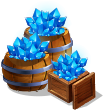Vol.5, Ch.3, P.11
Déu Tsellin—hosting grounds of the next great battle, and as well, the holy heights whereupon Rolf and his three storm-tides were soon to break.
Like a hardened scab upon the earth the mountain seemed, so bereft of tree and bush, and yet so abound of ridge and boulder. Who might glean the love of Yoná from so loveless a place? Why, none other than Her herd, of course. To their eyes, this was a mountain of miracles, for at the cusp of every dawn, there would accrete upon its slopes so grim and grey a sea of impenetrable mist—a sight much seeming to even a sceptic’s eye like the seat of the sacred made momentarily manifest, or the very breath of Yoná rolling in to soothe this scarry barren.
And in seeking to touch and smell and behold for themselves this most sacred of smokes, upon Houseltide of every year would pilgrims in their throngs set out from hearth and hovel and take to the holy road. And at its end would mountain and Deiva welcome them: with mists to remedy the weary flesh, with gentle slopes to encourage the blistered feet, with mild heights to milden the last leg. Indeed, tread the well-trodden way, and no herd of Yoná need fear the dangers of the road as they make for the sacred summit—awaiting them whereupon would be a great and solemn temple: the Dēlūbrum.
On this occasion, however, there was a curiosity. Houseltide was yet far off, but to the eyes of the acute Isfälter, there could be seen a stir upon slope, summit, and sanctum. Sure enough, a gathering was being held there. And aglint with distant silver as it was, some locals took it to be a sacred ceremony of sorts. Others thought the exact opposite, and to their merit, they thought true.
For gathered there were rather men of war.
“The 1st and 2nd Orders are presently arrived, Your Grace,” so reported a voice. Under the Dēlūbrum’s massive canopy it echoed, wandering amidst a maze of white marble pillars. And nodding assuredly to the tidings was Balbreau Isfält himself, the marquis to this marquisate and a prelate to the Yonaic sphere.
“And what of ours?” Balbreau asked, deliberate of timbre.
The reporting Quire captain straightened his back. “Yes, Grace. The Champions Salvator have assembled to schedule. The whole of our host stands at the ready.”
To that, the bishop of battle gave another nod. Even as the wildfires of war were due to encroach upon this sacred ground, his aspect yielded not the slightest hint of haste. Such surety served a salve upon the nerves of his subordinates so gathered here, for in these days of late, there had been much to be nervous about: to wit, the boundless, bristling, and many-pronged enemy, nearing day-by-day to take the mountain, like jaws slowly enclosing about a paralysed prey. What is more, it was not solely Nafílim that formed the fangs. Men, too, were marching on the mountain. Insurgents these souls were, to be sure, but nevertheless—fellow Men. A bitter truth to swallow, even for these hardened Quiremen, but having prevised the betrayal well beforehand, they did not despair.
Indeed, they did not. Even aface so fearsome a foe. Even amidst an emergency never before seen in all the long years that both fane and fiefdom have stood. And most unmoved amongst them was Balbreau himself, though certainly not on account of carelessness. No; like a chessmaster looming over the board, his was a confidence forged from ample prudence and preparation. Forget despair. Forget unease. These men were all of them steeled.
The Champions Salvator. Brimming in number and brimming in strength, theirs was a force superior to even a single Order, and withal brought now to bear upon these solemn slopes. But as though to unfurl the full might of Londosius, joining them were the realm’s fittest and finest: the 1st and 2nd Orders both. This was well; the princess had kept her promise. A promise now palpable to the eye as a crown of silver knights set upon the sullen mountain.
Ah, but of course, the mountain! Déu Tsellin! In and of itself did it stand a formidable fastness. For though tame of height and gradation altogether, many of its vales welcomed a hostile march as would a castle wall a lone and errant arrow. Therefore were the viable ways leading to the summit few and well-surveyed, and to any attacking force, that was a disadvantage as vexing as it was unavoidable.
Small wonder why fear would smoulder so feebly in the hearts of Balbreau and his Quire captains. To them, the road was paved and they had but to tread it—to cut down any and all cretins who would dare profane the Deiva’s name.
“And the pilgrim roads? Barred, I trust?” Balbreau asked on.
“Indeed, Grace,” answered another captain. “There withal spans many moons yet till Houseltide; nary a layman travels our open country.”
Verily was Déu Tsellin now vacant of souls, save for those expecting battle. The mandate had been sent straight from the princess’s desk and enforced with an iron hand, to prevent the arbitrary pilgrim from finding himself in what was soon to be a fiery battlefield. For his part, the marquis dissented not in the least. After all, amongst the enemy were to be Men. Former kith and kinsmen, set to be slaughtered like the Nafílim they now bedded with—such an unholy sight was not to meet any eye of the meek. It must not.
“Would our foe were barred as easily,” remarked Balbreau, hinting to another plan: to sally forth and harry the foe in the midst of their march, that they might never arrive at Déu Tsellin at all. Fine and well this was, sure, to await the enemy at the maws of the mountain, but that in itself was nary a necessity. In fact, it should prove a mighty boon, to hobble any of the invading three before the battle was even begun.
“Such we had thought possible against the Artean insurgence, at the least,” spoke a captain, “yet they, too, have displayed some deftness in their marching. Alas; to forestall even them alone would prove difficult.”
Not without a wisp of woe were those words delivered. The plan had sought not even a preliminary skirmish; mere snares and subterfuge would have sufficed to unnerve the enemy, if only the least numerous of them: that being the Cutcrowns in their easterly approach. But it would seem not even the traitorous sellswords were to be trifled with.
Nevertheless, the marquis remained unmoved. It was but a small misfortune, falling well within his expectations.
“To the niceties have they charted their courses,” he said. “Hence do they wend as warily as wolves; it is not a thing to be helped.”
To the credit of the Salvators’ supreme commander in this battle, Balbreau was most wise, as well, in the ways of war. As such, he understood fully the weight and worth of military intelligence, and thus had loosed his agents to spy out the enemy. What he had learnt from them in shadowed meetings in shadowed rooms was that Dennis, the ringleader to the rebels, was of a wit too well-oiled, as it were. “Mere snares and subterfuge”, then, had been a device long dubious to Balbreau.
“Be that as it may, I am told that the insurgents number fewer than was first foreseen,” the marquis continued. “Keep your eyes on their cards. The traitors might mean to play some sleight of hand.”
“Duly, Your Grace,” answered another Quireman. “But of numbers, though the Nafílim are amassed much to our projections, they remain, regrettably, no less evil a threat.”
“Ah, yes; ever a threat, evil,” Balbreau conceded. “But let not caution reduce you to cowards, men. The holy mountain yet graces us with advantages galore. And we have yet a Sacrāmentum in our stores—and withal a Vetimentum in hand, should ever so evil an hour come.”
To many miracles was Yoná a fertile mother. Why, that Man could wield magicks at all was attributable to Her charity. But as She was the mother, so was the Dēlūbrum Her hearth, to house the hallowed works of Her hand. And soon were they to see the light of day. The “Sacrāmenta” and the “Vetimenta”, as they were so called—what heathen might hope to live aface so holy a fury? “None,” as the Quiremen would quickly assert. None at all. For Yoná’s is not a light to be escaped, much less resisted.
“Vetimentum, you say?” There: a voice unsought. “Save yourselves the trouble, gentles; with it or no, victory lies easy on our laps.”
Piercingly plain was the manner of that utterance—as plainly unpolished as the man that dared it. Amongst the ranks he stood, lax and leaning, his smirk overgrown with a grassy stubble and his head with a bush of night-black hair.
His fellow captains of the Quire crannied their brows at him, the words “not again” writ clear upon their faces. That smooth insolence of his, however, unsettled the marquis not in the slightest.
“Save it we would, Yoná willing,” Balbreau admonished him, “for arts forbidden be so for reasons wise, Lord Sven.”
“Oh, to be sure,” said this “Sven” with a shrug of the shoulders. “Sacrificing live Nafílim by the scores—brings a tear to a butcher’s eye, wouldn’t you say?”
A sensitive ear might have caught a tinge of distaste in Sven’s tone. Indeed, it would seem that not as wanton as his comrades this Quireman was to turn to holy wrath and relics.
“The sword-devout would spare us the dirty slaughter, then?” Balbreau pressed him. “Or will he keep scabbarded the Sacrāmentum we so furnished him?”
There stood one reason why Sven was so suffered here: his sheer capability. A devout of the sword as he was of the spirituality, Sven was accounted the keenest bladesman in all the Champions Salvator—and hence, the clearest candidate to wield the Sacrāmentum in question.
“Hmm,” he hummed half-musingly. “I’ll sleep on it. How about that?”
Balbreau humoured the terse answer with a terse blink. Stoic as ever, he turned away and looked next to another member of this martial assembly, who, to his eyes, seemed the very inverse to Sven the sloven. At attention this soul stood: a wunderkind of spellweaving, the supreme soldier of the Salvators, and withal a man of more renown than even his sword-devout colleague.
“Alfred,” Balbreau addressed him. “I trust you stand as ready as your brothers-in-arms?”
“Yes, Grace,” came the answer. “Ever and always.”
If Sven were a lump of coal, then this prodigy would be as a bar of gleaming gold. Alfred Isfält, the very son of Balbreau; handsome he was, sporting feathery, saffron hair of a length to conceal even his ears.
“With the will of Yoná,” Alfred said on, “let us exact from these sinners the price of profaning our mountain.”
A chilling declaration, conveyed with a voice and gaze no less cold and keen. Alfred then bowed, deliberate and almost distant. Yes; though aface so affrighting a battle and so flagrant an affront to the Deiva both, there could be sensed in this sorcerer not a pittance of passion or apprehension.
───────── ♰ ─────────











Comment (0)